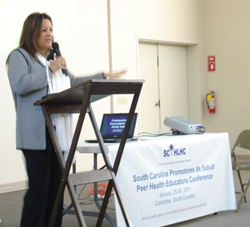South Carolina holds first conference for sharing 'promotores' model for healthcare intervention, information
March 7, 2011
For several decades, many countries have capitalized on the strengths and leadership skills of "promotores" to promote health among the children and adults in their communities.
Over the past decade, their work has been of interest to South Carolina's healthcare professionals who have seen the value of the promotores model in delivering health information and interventions to the state's growing Hispanic and Latino population.
The S.C. Hispanic/Latino Health Coalition (SCHLHC), working in conjunction with Arnold School of Public Health faculty, staff and students, recently held the state's first conference on the role of promotores in improving the health of Hispanic and Latino communities. Margarita Holguin, founding director of the Chula Vista Community Collaborative in San Diego, was the featured keynote speaker. Other speakers included Rosa Villoch-Santiago of the American Cancer Society and Florence Siman, director of El Pueblo's promotor program in North Carolina.
The event, "Promotores, Impacting Community Health," drew more than 100 promotores, healthcare and community leaders, educators and public health and nursing students from South Carolina, North Carolina, Kentucky, California and Washington, D.C., said Dr. Deborah Billings, an Arnold School faculty member in the Department of Health Promotion, Education, and Behavior, and the SCHLHC chair. It was held in both Spanish and English.

Margarita Holguin, founding director of the
Chula Vista Community Collaborative,
was the featured guest speaker for the recent
"Promotores" program in Columbia.
"The promotores model to improve health in our Hispanic and Latino communities is being recognized as increasingly important and valuable here in South Carolina," said Billings. "Our conference gave community leaders and healthcare professionals an opportunity to learn about the logistics of implementing a promotores program in their programs and services. It also provided a space for promotores from different states who work on different health issues to connect and share experiences."
The work of Brazilian educator, activist and scholar, Paulo Freire, was key to shaping the promotor model, one that focuses on empowering peers and community members to deliver health information within their own communities. His methods were adapted in the United States beginning in the 1950s.
The use of promotores expanded, Billings said, after the World Health Organization's International Conference on Primary Health Care's Alma Ata Declaration in 1978. The declaration supported greater use of "health workers, including physicians, nurses, midwives, auxiliaries and community workers as applicable, as well as traditional practitioners as needed, suitably trained socially and technically to work as a health team and to respond to the expressed health needs of the community."
The declaration was a key factor leading to organization of promotores in the U.S. public health workforce, said Alexis Koskan, a doctoral student in the Department of Health Promotion, Education, and Behavior and the communications chair for SCHLHC.
"Everyone has some responsibility for their health, and increasingly we want to focus on prevention," said Billings. "By training leaders in our communities on specific or broad health matters, we are able to reach more people and reach them in a way that is more culturally sensitive and relevant. This will be greatly beneficial in helping people take charge of their health and to navigate the complex health and social services when they need them."
The promotores model is based on community leadership and health practice and prevention, she said.
"Promotores are informed about the health needs of their communities, and they become an important link between individuals and the health and social services where they live," she said. "Moreover, service providers can tap into their expertise when they have programs and need to reach communities. It is a win-win situation for all involved."
The event drew the support of many key businesses and service providers, including the American Cancer Society, FirstChoice by Select Health of South Carolina, Comunicar Spanish Language Services, Doctors Care, S.C. Primary Health Care Association, Lexington Medical Center, the Good Samaritan Clinic, Absolute Total Care, PASOs, S.C. Hispanic Outreach, Walmart, the Community Medical Clinic of Kershaw, Eau Claire Cooperative Health Centers Inc. and S.C. DHEC. St. Mary's Episcopal Church in Columbia donated the space for the event.
Conference committee members included Rosa Diaz-Grant (SCHLHC), Maggie Ortiz (Family Connections), Evelyn Lugo (American Cancer Society), Anna Walton (Sexual Trauma Services of the Midlands), Andrew Halbert (Eau Claire Health Care Coorperatives, Inc.), Elsa Pardo (S.C. Hispanic Outreach), and Amanda Elias-Vargas (Lexington Medical Center).
USC faculty, staff and students serving on the conference committee included Dr. Debbie Billings, Margarita Franco, Julie Smithwick-Leone, and Alexis Koskan, all from the Arnold School, and Dr. DeAnne Messias, College of Nursing.



_01.jpg)